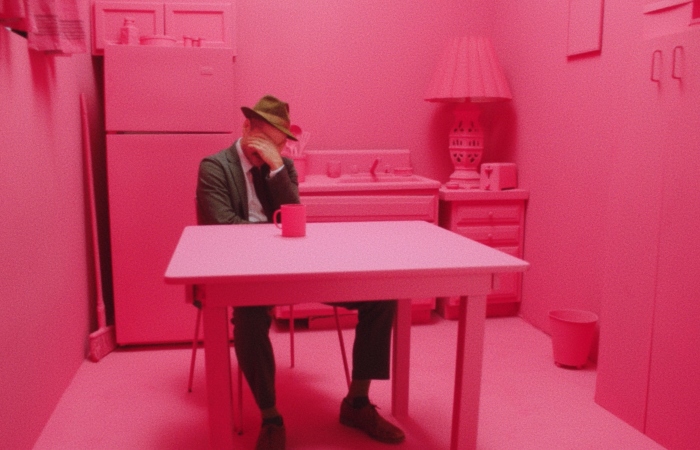“Strawberry Mansion,” a film both written and directed by Albert Birney and Kentucker Audley that had its world premiere in 2021, delivers a rich, poignant, and gripping perspective on what it actually means to live in a world like we’ve constructed for ourselves in this age.
The movie is set in the near future, but everything seems designed in such a way to highlight a continuity with the present — and the past. Although here, the government imposes taxes on items the mind creates in dreams, the world doesn’t look like a dystopian hellscape. It pretty much just resembles the exact environment in which humanity can be found now — though I’ve yet to see a chicken shake offered for sale anywhere and might recoil if I did.
James Preble, a main character in “Strawberry Mansion” who was portrayed by Audley, dresses in a fashion evocative of past styles. Viewing dreams had by another main character, we often see that other figure — Arabella Isadora, played by Penny Fuller — as a substantially younger version of herself, captured instead by actress Grace Glowicki. (To accommodate the tax regime, dreams are recorded.)
Does Advertising Care About Us?
And then we get to “Buddy.” Linas Phillips’s Buddy, as he’s known, appears time and again in dreams had by Audley’s character, and this initially unexplained figure is often, quite simply, hawking wares. In a later scene in which Preble and the younger Isadora are trying to escape Buddy’s presence in a dream world, which follows a revelation that Buddy is essentially serving as an avatar for the in-dream advertising ambitions of major corporations, he starts multiplying, appearing again and again alongside himself in a scene that actually captures with startling precision what it’s like to live here.
Think about it. How many ads do you see on a daily basis? On the internet, where reliance on such an advertising presence has been made mandatory in some cases for financial survival, or on television, where it’s much the same, these ads persist. Head outside, and you might see a billboard (or five). While New York City has a lot to offer, one of the tourist traps is Times Square, and if you actually look around in that area of Manhattan, it’s ad after ad after ad.
While it would be ignorant to categorically dismiss advertising as immoral, it would also be ignorant to simply gloss over its effects and the possibility for nefarious manipulation. It’s a massive global industry. How does it actually affect us? Actual human desire, meaning the things that might emerge from nothing but individual ambition — is there a danger of that simply being squelched?
It was compelling when, later in the movie, Buddy simply watches as Preble is slowly smothered and faces potential death. The locus of interest for so many of these advertising ambitions is not making you a better person. It’s making money. While this feels straightforward, how many people don’t have quite the same level of media literacy and might be more easily duped by these efforts?
Finding a Place to Live
“Strawberry Mansion” doesn’t simply moralize. It’s also a touching story, as Preble and Isadora connect. In dream sequences early in the film, the audience sees the younger Isadora partly with the aid of low-angle shots that give her an almost-angelic air, which connects with how Preble himself will eventually see her (and be helped by her). (She’s also dressed in white.) The physicality with which Audley portrays Preble seems to gradually loosen up as he realizes the truth of the system in which he’s been working and the connection he has with the woman he’s met both in her older and younger versions.
In totality, “Strawberry Mansion” feels inspiring in a very direct sense. Whether it’s in the self-directed dream logic of key plot points or the explicit statements in dialogue about making your own personal choice (rather than what’s being pushed by “Buddy’s” handlers), you can find your own path. After searching for the younger Bella in a dream world, the reunited Preble then sets himself down a similarly epic, sweeping quest to reconnect with his own body and life in general before it’s too late. (There’s a time crunch.) “Strawberry Mansion” highlights the opportunity for a gentle embrace of life amid utter absurdity.
Featured image: Music Box Films
You may also like
-
“Robin Kid: Searching For America” at Templon New York: Art Exhibition Review
-
An Exhibition of Artist Reinhard Mucha at Luhring Augustine in New York City: Review
-
“Mike Shultis: Déjà vu” at Morgan Presents in New York City: Art Exhibition Review
-
Leonardo Drew at Galerie Lelong & Co., New York: Art Exhibition Review
-
“Flags: A Group Show” at Paula Cooper Gallery, New York: Art Exhibition Review
